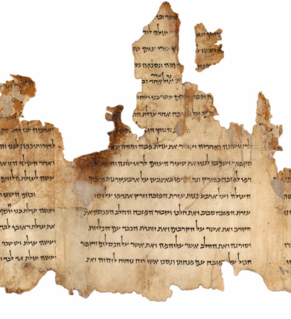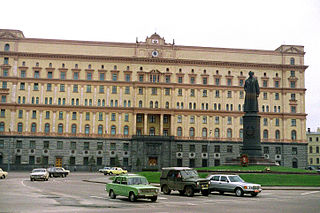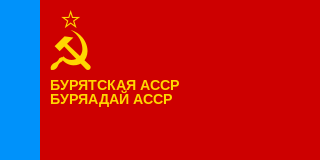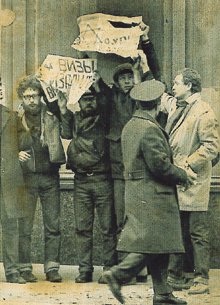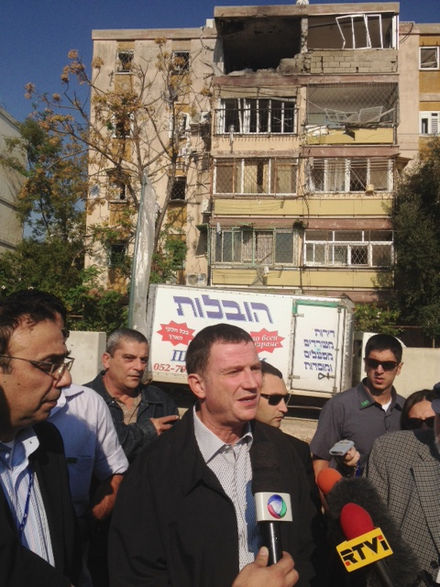Likud, officially the Likud-National Liberal Movement, is a centre-right to right-wing political party in Israel. A secular party, it was founded in 1973 by Menachem Begin and Ariel Sharon in an alliance with several right-wing parties. Likud's landslide victory in the 1977 elections was a major turning point in the country's political history, marking the first time the left had lost power. In addition, it was the first time in Israel that a right-wing party won the plurality of the votes. However, after ruling the country for most of the 1980s, the party lost the Knesset election in 1992. Nevertheless, Likud's candidate Benjamin Netanyahu did win the vote for Prime Minister in 1996 and was given the task of forming a government after the 1996 elections. Netanyahu's government fell apart after a vote of no confidence, which led to elections being called in 1999 and Likud losing power to the One Israel coalition led by Ehud Barak.

Gideon Moshe Sa'ar is an Israeli politician who served as a member of the Knesset for the political party Likud between 2003 and 2014. During his time in government, he held the posts of Cabinet Secretary, Chairman of the Coalition Minister of the Interior and Education Minister. In April 2019, he was re-elected to the 21st Knesset.
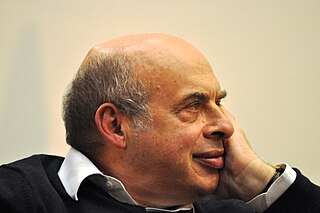
Natan Sharansky is an Israeli politician, human rights activist and author who, as a refusenik in the Soviet Union during the 1970s and 1980s, spent nine years in Soviet prisons. He served as Chairman of the Executive of the Jewish Agency from June 2009 to August 2018.

Yosef Mendelevitch, was a refusenik from the former Soviet Union, also known as a "Prisoner of Zion" and now a politically unaffiliated rabbi living in Jerusalem who gained fame for his adherence to Judaism and public attempts to emigrate to Israel at a time when it was against the law in the USSR.

David Levy is an Israeli politician who served as a member of the Knesset between 1969 and 2006, as well as Deputy Prime Minister, Minister of Foreign Affairs, Minister of Immigrant Absorption, Minister of Housing and Construction and as a Minister without Portfolio. Although most of his time as a Knesset member was spent with Likud, he also led the breakaway Gesher faction, which formed part of Ehud Barak's Labor-led government between 1999 and 2001.
Yisrael BaAliyah was a political party in Israel between its formation in 1996 and its merger into Likud in 2003. It was formed to represent the interests of Russian immigrants by former refuseniks Natan Sharansky and Yuli-Yoel Edelstein. Initially a centrist party, it drifted to the right towards the end of its existence.
The Government of Israel exercises executive authority in the State of Israel. It consists of ministers who are chosen and led by the prime minister. The composition of the government must be approved by a vote of confidence in the Knesset. Under Israeli law, the prime minister may dismiss members of the government, but must do so in writing, and new appointees must be approved by the Knesset. Most ministers lead ministries, though some are ministers without portfolio. Most ministers are members of the Knesset, though only the Prime Minister and the "designated acting prime minister" are required to be Knesset members. Some ministers are also called deputy and vice prime ministers. Unlike the designated acting prime minister, these roles have no statutory meanings. The government operates in accordance with the Basic Law. It meets on Sundays weekly in Jerusalem. There may be additional meetings if circumstances require it. The prime minister convenes these meetings. On 30 May 2019, a vote was passed to temporarily dissolve the Knesset until September 2019.

Dan Meridor is an Israeli politician and minister. A longtime member of the Likud party, in the late 1990s he became one of the founders of the Centre Party. He rejoined Likud a decade later, and returned to the Knesset following the 2009 elections. Meridor served at various times as Deputy Prime Minister, Minister of Finance, Minister of Justice and Minister of Intelligence and Atomic Energy in the Israeli Cabinet. In 2014, Meridor succeeded Avi Primor as president of the Israel Council on Foreign Relations, an institute of international affairs which operates under the auspices of the World Jewish Congress.

Danny Danon is Israel’s Permanent Representative to the United Nations. Danon previously served as a member of the Knesset from the Likud Party, as Minister of Science, Technology and Space, and as Deputy Minister of Defense. During his term in the 18th Knesset, Danon served as Deputy Speaker, Chair of the Special Committee on the Rights of the Child, and Chair of the Committee for Immigration, Absorption and Diaspora Affairs. In June 2016, Danon was elected as chair of the UN’s Legal Committee, the first Israeli to ever hold the position.

Ze'ev Elkin is an Israeli politician who currently serves as a member of the Knesset for Likud, and as Minister of Jerusalem Affairs and Minister of Environmental Protection.

A prisoner of Zion is a Jew who was imprisoned or deported for Zionist activity in a country where such activity was prohibited. The phrase is taken from words of Rabbi Judah Halevi: "Oh Zion, will you not ask after the welfare of your prisoners."

Yisrael Katz is an Israeli politician who served as a member of the Knesset for Likud, as the Minister of Transportation, Minister of Intelligence, Minister of Foreign Affairs, and as member of the Security Cabinet of Israel.
Early elections for the nineteenth Knesset were held in Israel on 22 January 2013. Public debate over the Tal Law had nearly led to early elections in 2012, but they were aborted at the last moment after Kadima briefly joined the government. The elections were later called in early October 2012 after failure to agree on the budget for the 2013 fiscal year.
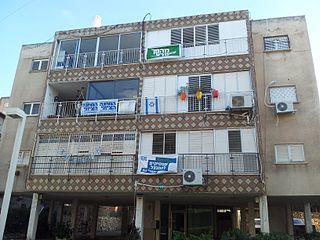
Early elections for the twentieth Knesset were held in Israel on 17 March 2015. Disagreements within the governing coalition, particularly over the budget and a "Jewish state" proposal, led to the dissolution of the government in December 2014. The Labor Party and Hatnuah formed a coalition, called Zionist Union, with the hope of defeating the Likud party, which had led the previous governing coalition along with Yisrael Beiteinu, Yesh Atid, The Jewish Home and Hatnuah.

Haneen Zoabi, is an Israeli Arab politician. The first Arab woman to be elected to the legislature on an Arab party's list, she served as a member of the Knesset for the Balad party between 2009 and 2019.

A leadership election was held by the Likud party on 31 December 2014. It was won by incumbent Prime Minister and leader of Likud Benjamin Netanyahu.

Meretz is a left-wing, social-democratic and green political party in Israel. The party was originally formed in 1992 with the union of Ratz, Mapam and Shinui, and was at its peak in the 13th Knesset between 1992 and 1996, during which it held 12 seats. In the April 2019 elections, the party won four seats.
Early legislative elections were held in Israel on 9 April 2019 to elect the 120 members of the 21st Knesset. Elections had been due in November 2019, but were brought forward following a dispute between members of the current government over a bill on national service for the ultra-Orthodox population, as well as impending corruption charges against incumbent Prime Minister Benjamin Netanyahu.

The United Right is an Israeli alliance of right-wing to far-right religious Zionist parties containing The Jewish Home, Tkuma, and Otzma Yehudit. The list was created ahead of the April 2019 Israeli legislative election, after the Israeli Prime Minister, Benjamin Netanyahu, urged the Jewish Home alliance to accept Otzma Yehudit as part of its list for the next election to avoid losing votes for the right-wing bloc. The parties' symbol is "טב".

